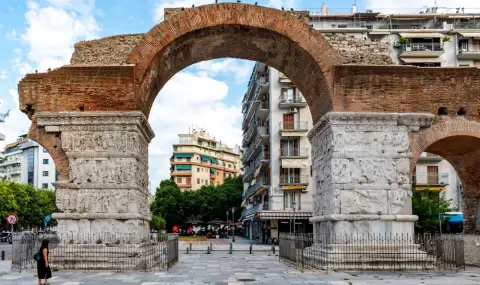A mass grave from the 1946-1949 Greek civil war has been discovered by accident during construction work in a park in Thessaloniki, the Associated Press reported. By March, the bones of 33 people had been found buried in an unmarked pit in the shadow of a Byzantine fortress.
“We found a lot of bullets in the heads, in the skulls”, said the supervising engineer Harris Harismiadis, quoted by the AP.
Ancient remains or objects are often discovered in Greece. But the huge fortress of Yedi Kule was a prison where communist sympathizers were tortured and executed during the 1946-49 Greek civil war. Tens of thousands die in fighting between Western-backed government forces and leftist rebels – a brutal conflict with death squads, child abductions and mass evictions, the AP recalls.
The Greek Archaeological Service has allowed the site to be cleared to continue construction work because the bones are less than 100 years old, but authorities in the Thessaloniki suburb of Neapolis-Sikis have continued the excavation, saying the chance find is of "great historical and national importance".
In recent weeks, descendants have come to the site, leaving flowers and asking authorities to conduct a DNA test "so they can find the remains of their grandfather, great-grandfather or uncle," said Simos Daniilidis, who has been mayor of Neapolis-Sikis since 1994.
According to historians and the Greek Communist Party, 400 prisoners were executed at Yedi Koule.
For The families of the murdered pro-communist Greeks say the discovery at the National Resistance Park is a revival of a legacy of the war that had been kept secret to avoid reigniting old feuds. The small site is the first mass grave from the Greek civil war to be exhumed.
Today, the Communist Party of Greece is a major political force, largely thanks to its role in the country's resistance during World War II, the AP notes.
A civil war broke out in Greece after World War II. Coming after devastation across the continent, it quickly lost international attention, but the conflict marked a turning point: in 1947, U.S. President Harry Truman presented a policy of anti-communist intervention to Congress – The Truman Doctrine, which provided economic and military aid to Greece to keep it out of the Soviet orbit, recalls the AP.
Wartime laws in Greece were gradually repealed and completely abolished only in 1989. Data on speedy trials and executions have never been published. No political force has pushed for the excavation of the alleged grave sites, the agency points out.
Politicians still use very cautious language when talking about the past, and the discovery in Thessaloniki was met with a muted public reaction. The country's center-right government did not directly address the find - a reminder that for many Greeks it is still easier to ignore the ghosts of the past than to confront them, the agency comments.
Decades ago, the neighborhood park in Thessaloniki was a field on the outskirts of the city. Today, the park is frequented by retirees and surrounded by apartment buildings filled with middle-class families. Residents say bones were discovered when the foundations of the apartment buildings were laid, but no investigation was conducted.
Executions by army death squads continued into the 1950s and were public knowledge, but the graves were unmarked and secret. Author and historian Spyros Kouzinopoulos, who was born in Thessaloniki, has spent decades researching the executions at Yedi Koule, including the humiliations the prisoners were subjected to in their final hours.
The city authorities are taking steps to conduct DNA testing of the remains and are calling on the families of the missing to provide genetic material. This way, the bodies can be identified and returned to their relatives.
Mayor Daniilidis has ordered the excavation to be expanded to other parts of the park in the coming weeks.
"We need to send a message," he said. "Never again."
